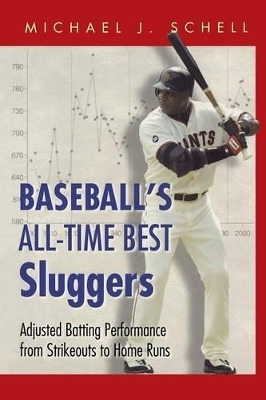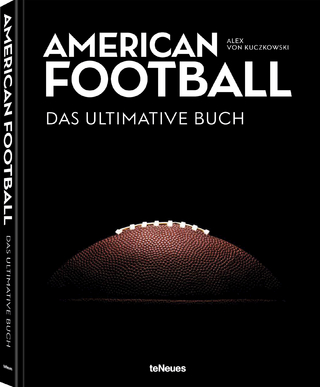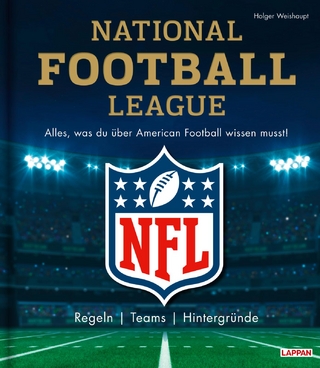
Baseball’s All-Time Best Sluggers
Princeton University Press (Verlag)
978-0-691-17111-1 (ISBN)
Building on the traditions of renowned baseball historians Pete Palmer and Bill James, he has analyzed the most important factors impacting the sport, including the relative difficulty of hitting in different ballparks, the length of hitters' careers, the talent pool from which players are drawn, player aging, and changes in the game that have raised or lowered major-league batting averages. Schell's book finally levels the playing field, giving new credit to hitters who played in adverse conditions, and downgrading others who faced fewer obstacles. It also provides rankings based on players' positions. For example, Derek Jeter ranks 295th out of 1,140 on the best batters list, but jumps to 103rd in the position-adjusted list, reflecting his offensive prowess among shortstops. Replete with dozens of never-before reported stories and statistics, Baseball's All-Time Best Sluggers will forever shape the way baseball fans view the greatest heroes of America's national pastime. Answers: 1. Coors Field 2. Mel Ott 3. Barry Bonds, 2001-2004 seasons
Michael J. Schell is Professor of Biostatistics at the University of North Carolina and Director of the Biostatistics Core Facility in the Lineberger Comprehensive Cancer Center. He is the author of Baseball's All-Time Best Hitters: How Statistics Can Level the Playing Field (Princeton).
Preface ix Abbreviations xi Chapter 1: Fair Ball!: Why Adjustments Are Needed 1 PART ONE: The Methods Chapter 2: Manager's Game Plan: Method for Identifying the Best Batters 11 Chapter 3: New Ball!: Historical Changes in Offensive Events 28 Chapter 4: Calling It a Career: Examining Player Aging 45 Chapter 5: Talent Search: Measuring the Spread in Player Performance 58 Chapter 6: Home Park Advantage: A Closer Look at Park Effects 69 PART TWO: The Findings Chapter 7: Swing, Batter!: Adjusting Batting Average 101 Chapter 8: Hit ... and Run: Adjusting Double and Triple Totals 108 Chapter 9: This One's Outta Here!: Adjusting Home Run Totals 118 Chapter 10: Changing the Score: Adjusting Run and RBI Totals 131 Chapter 11: The Count: Adjusting Walk and Strikeout Totals 149 Chapter 12: Stealing the Show: Adjusting Stolen Base Totals 162 Chapter 13: Putting It All Together: First, a Look at Traditional Measures 168 Chapter 14: Fantasy League: Baseball's Best Batters 177 Chapter 15: The Players Take the Field: Accounting for Player Position 189 Chapter 16: Final Score: Updates for the 2004 Season 204 Chapter 17: Post-Game Report: Conclusions 209 APPENDICES: Statistical Methods A The Piecewise Linear Regression Method 219 B Moving Average Smoothing of Data 226 C The Multiple Changepoint Regression Procedure 228 D How to Estimate Ballpark Effects 235 E Transformations of Offensive Event Averages 247 F How to Adjust for Doubles and Triples 257 G Predicting Runs and RBIs from the Batting Record 260 Adjustment Data H Regular Player Event Averages 265 I Event Performance Spreads 266 J Event Park Effects 267 K Home Run Park Effects 284 Player Results L Best Individual Seasons 297 M Best Careers 327 N Adjusted Career Offensive Averages 356 Glossary 380 References 387 Player Index 389
| Erscheinungsdatum | 03.06.2016 |
|---|---|
| Verlagsort | New Jersey |
| Sprache | englisch |
| Maße | 152 x 235 mm |
| Gewicht | 567 g |
| Themenwelt | Sachbuch/Ratgeber ► Sport ► Ballsport |
| Weitere Fachgebiete ► Sportwissenschaft | |
| ISBN-10 | 0-691-17111-4 / 0691171114 |
| ISBN-13 | 978-0-691-17111-1 / 9780691171111 |
| Zustand | Neuware |
| Informationen gemäß Produktsicherheitsverordnung (GPSR) | |
| Haben Sie eine Frage zum Produkt? |
aus dem Bereich


